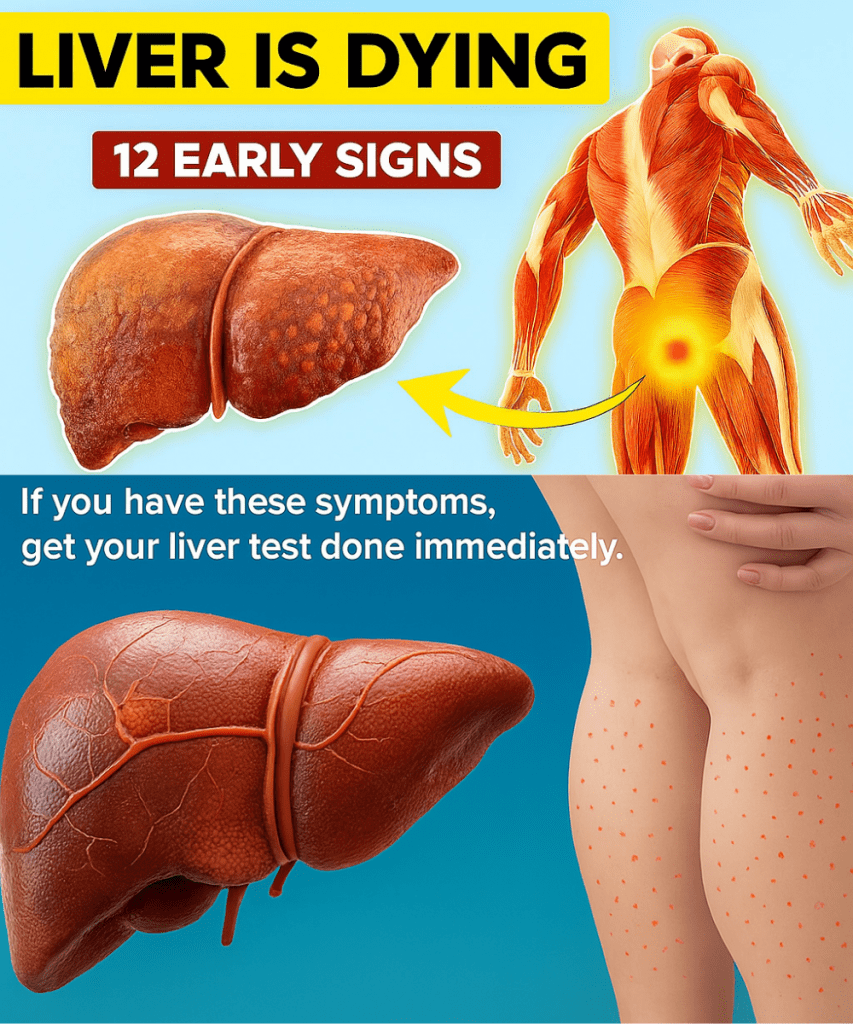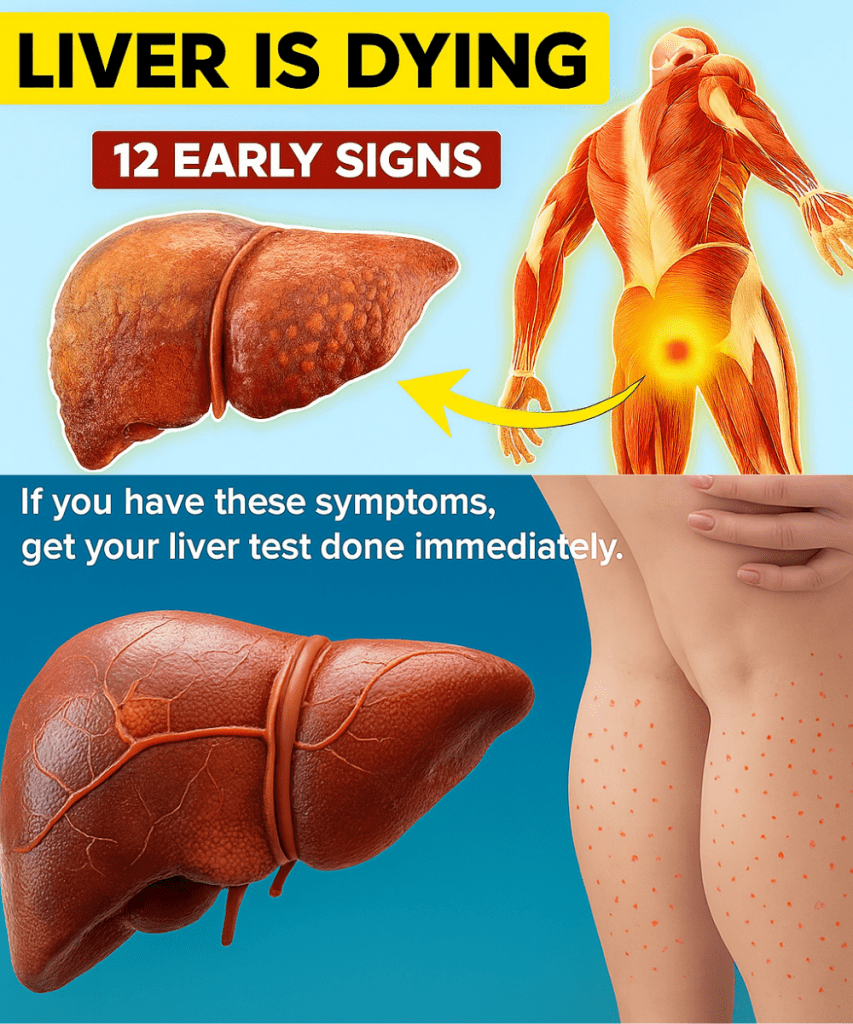Your liver is a silent hero, working tirelessly to detoxify your body, regulate metabolism, and keep you alive. But what happens when this vital organ begins to falter? Liver cirrhosis, a condition where healthy liver tissue is replaced by scar tissue, can creep up without fanfare, leaving devastation in its wake. The scariest part? You might not even know it’s happening until it’s too late. This article unveils 12 early warning signs of liver cirrhosis that demand your attention. By recognizing these subtle cries for help, you can take action to protect your health and potentially save your life. Are you ready to listen to your body’s whispers before they become screams?

🌡️ Fatigue That Drains Your Soul
Feeling tired is one thing, but a bone-deep exhaustion that lingers no matter how much you rest is another. Cirrhosis disrupts your liver’s ability to process toxins and produce energy, leaving you feeling like you’re dragging through life. If you’re constantly wiped out despite adequate sleep, your liver might be struggling to keep up. Don’t brush it off as just stress or a busy schedule—pay attention to this red flag.
🩺 Unexplained Weight Loss
Dropping pounds without trying might sound like a dream, but it could be a nightmare for your liver. Cirrhosis can impair nutrient absorption and metabolism, causing your body to shed weight unexpectedly. If your clothes are suddenly looser and you haven’t changed your diet or exercise habits, it’s time to question what’s happening inside. Your liver could be signaling distress.
🩸 Yellowing Skin and Eyes (Jaundice)
One of the most recognizable signs of liver trouble is jaundice, where your skin and the whites of your eyes take on a yellowish hue. This happens when your liver can’t process bilirubin, a waste product, leading to its buildup in your body. Jaundice isn’t just a cosmetic issue—it’s a glaring warning that your liver is in serious trouble. If you notice this symptom, don’t wait to seek medical advice.
💧 Swelling in Your Legs or Abdomen
Ever noticed your ankles puffing up or your belly feeling bloated beyond reason? Cirrhosis can cause fluid retention, leading to swelling in your legs (edema) or abdomen (ascites). This isn’t just discomfort—it’s your body struggling to balance fluids because your liver isn’t functioning properly. If you’re experiencing unexplained swelling, it’s a sign to take seriously.
🩹 Easy Bruising and Bleeding
If you’re bruising at the slightest bump or bleeding more than usual from small cuts, your liver might be to blame. Cirrhosis reduces the production of clotting proteins, making your blood less likely to clot properly. This can lead to frequent nosebleeds, bleeding gums, or bruises that seem to appear out of nowhere. These subtle signs are your liver’s way of crying for help.
🤢 Persistent Nausea or Loss of Appetite
Feeling queasy or turning away from your favorite foods? Cirrhosis can disrupt digestion, causing nausea, vomiting, or a complete loss of appetite. Toxins building up in your body due to a struggling liver can make eating feel like a chore. If you’re skipping meals or feeling sick after eating, don’t dismiss it as a passing bug—your liver might be sending a distress signal.
🧠 Confusion or Trouble Concentrating
Your liver plays a surprising role in brain health. When it’s scarred, toxins like ammonia can accumulate in your blood, leading to hepatic encephalopathy—a condition that causes confusion, memory problems, or difficulty focusing. If you’re feeling foggy or struggling to stay sharp, it could be more than just a bad day. Your liver might be silently impairing your mind.
😷 Itchy Skin That Won’t Quit
Persistent itching, especially on your hands and feet, can be a sneaky sign of liver trouble. When bile salts build up under your skin due to cirrhosis, it can cause intense itching that no cream or lotion can soothe. If you’re scratching relentlessly and can’t find relief, your liver might be trying to tell you something.
💤 Sleep Disturbances and Insomnia
Struggling to fall asleep or stay asleep? Cirrhosis can disrupt your body’s natural rhythms, leading to insomnia or restless nights. Toxins accumulating in your system can throw off your sleep cycle, leaving you tossing and turning. If you’re waking up exhausted despite spending hours in bed, your liver could be the hidden culprit.
🩺 Dark Urine and Pale Stools
Your bathroom habits can reveal a lot about your liver. Dark, tea-colored urine or pale, clay-like stools are warning signs of cirrhosis. These changes happen when your liver struggles to process waste products, altering the color and consistency of your urine and stools. If you notice these shifts, don’t ignore them—they’re critical clues about your liver’s health.
🔥 Chronic Abdominal Pain
A dull ache or discomfort in your upper right abdomen could point to liver trouble. Cirrhosis can cause inflammation or pressure in the liver, leading to persistent pain that’s easy to mistake for something less serious, like indigestion. If you’re feeling discomfort in this area, especially alongside other symptoms, your liver might be begging for attention.
🩹 Spider-Like Blood Vessels on Your Skin
Have you noticed tiny, spider-like veins appearing on your face, chest, or arms? These are called spider angiomas, and they’re caused by increased pressure in your blood vessels due to cirrhosis. While they might seem harmless, these delicate red patterns are a visible sign that your liver is struggling to keep up.
Why do these symptoms matter? Because your liver doesn’t scream for help—it whispers. Cirrhosis develops slowly, often over years, and by the time you notice obvious signs, the damage may be extensive. The good news? Catching these warning signs early can make all the difference. Early detection allows for interventions that can slow or even halt the progression of liver damage, giving you a fighting chance to protect this vital organ.
Let’s dive deeper into why your liver deserves your attention. This powerhouse organ filters toxins from your blood, produces essential proteins, and stores energy for your body. When cirrhosis sets in, scar tissue replaces healthy liver cells, choking off its ability to function. This isn’t just a minor inconvenience—it can lead to life-threatening complications like liver failure or liver cancer. The stakes are high, and ignoring the signs could cost you dearly.
What causes cirrhosis to sneak up on you? Chronic alcohol consumption, viral hepatitis, and fatty liver disease are among the top culprits. But lifestyle factors like poor diet, obesity, or even certain medications can also put your liver at risk. The scary truth is that anyone can develop cirrhosis, and many people don’t realize they’re at risk until the damage is done. Are you unknowingly putting your liver in danger?
Now, let’s talk about what you can do if you’re noticing these symptoms. First, don’t panic—but don’t ignore them either. Schedule a visit with your healthcare provider as soon as possible. Blood tests, imaging, or a liver biopsy can help diagnose cirrhosis and determine its severity. Early intervention is key, and your doctor can guide you toward lifestyle changes or treatments to support your liver.
🌿 Protecting Your Liver: Steps You Can Take Today
Knowledge is power, and taking proactive steps can help safeguard your liver. Start with a balanced diet rich in fruits, vegetables, and whole grains. Limit alcohol consumption, as even moderate drinking can strain your liver over time. Exercise regularly to maintain a healthy weight, as obesity is a major risk factor for fatty liver disease. And don’t forget to stay hydrated—your liver needs water to flush out toxins effectively.
🩺 When to Seek Help
If you’re experiencing one or more of these symptoms, don’t wait for them to worsen. Time is critical when it comes to liver health. A healthcare provider can run tests to assess your liver function and recommend next steps. Catching cirrhosis early can open the door to treatments that slow its progression, such as medications, dietary changes, or even a liver transplant in severe cases.

🧠 The Emotional Toll of Liver Disease
Living with the uncertainty of liver issues can take a mental toll. The fear of a serious diagnosis, coupled with symptoms like fatigue or confusion, can leave you feeling overwhelmed. It’s okay to feel scared, but you don’t have to face it alone. Reach out to loved ones or a support group to share your concerns. Your mental health is just as important as your physical health, and addressing both can empower you to take control.
🌟 A Call to Action for Your Health
Your liver is working overtime to keep you alive, but it’s not invincible. These 12 signs—fatigue, weight loss, jaundice, swelling, bruising, nausea, confusion, itching, sleep issues, dark urine, abdominal pain, and spider veins—are your body’s way of sounding the alarm. Don’t ignore them. By listening to these warning signals and acting swiftly, you can protect your liver and your future.
Take a moment to reflect: Are you experiencing any of these symptoms? Have you been dismissing them as “no big deal”? Your liver doesn’t have a voice, but it’s speaking to you through these signs. Make the choice to listen. Schedule that doctor’s appointment, rethink your lifestyle choices, and prioritize your health. Your liver—and your life—depend on it.
This isn’t just about avoiding a disease; it’s about reclaiming your vitality. A healthy liver means more energy, sharper focus, and a body that feels ready to take on the world. Don’t let cirrhosis steal that from you. Act now, and let your liver’s silent SOS become a story of resilience and recovery. Are you ready to take the first step?









